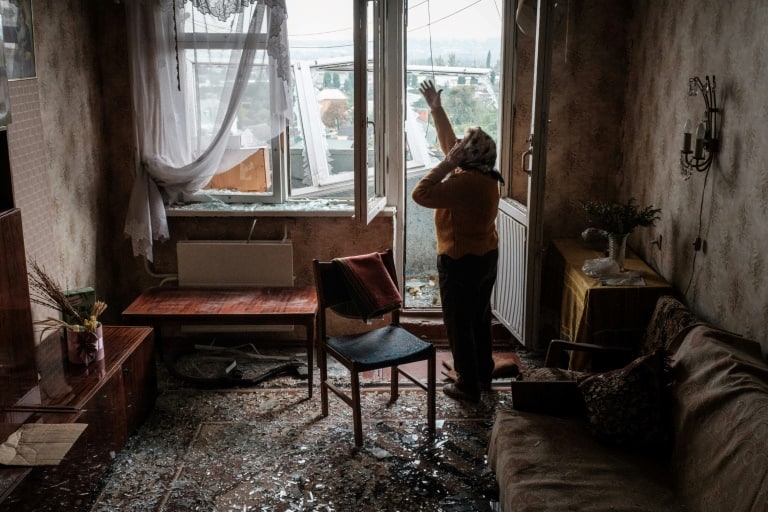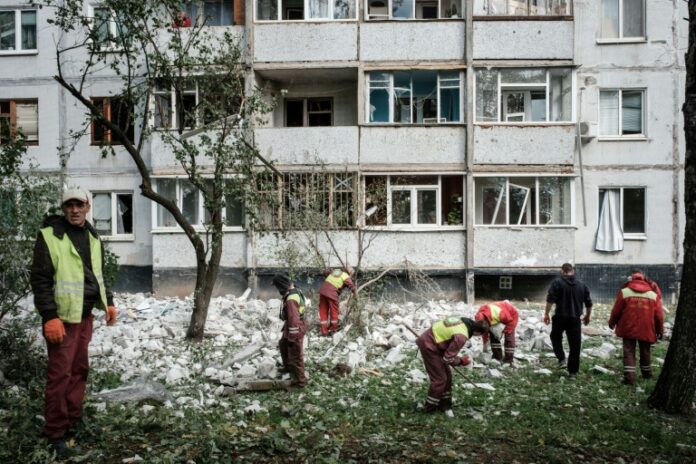Moscow began its mandatory troop call-up Thursday to try to bolster a stumbling war effort in Ukraine, with authorities saying thousands had volunteered even as Russian men fled the country to avoid being forced to fight.
Amateur footage posted on social media since President Vladimir Putin ordered the mobilisation of reservists on Wednesday purported to show hundreds of Russian citizens across the country responding to military summons.
The call-up came as Moscow-held regions of Ukraine are to vote in coming days on whether to become part of Russia in referendums that have been called an unlawful land grab by Kyiv and its allies.
Moscow took these steps after Ukrainian forces seized back most of the northeastern Kharkiv region, which has been seen as a possible turning point in the seven-month war that had fallen into stalemate.
The Russian military said Thursday that at least 10,000 people had volunteered to fight in 24 hours since the order, but men also rushed to leave Russia before they were made to join.
“I don’t want to go to the war,” a man named Dmitri, who had flown to Armenia with just one small bag, told AFP. “I don’t want to die in this senseless war. This is a fratricidal war.”

Annexation ‘vote’
Military-aged men made up the majority of those arriving off the latest flight from Moscow at the Armenian airport and many were reluctant to speak.
Yerevan has become a major destination for Russians fleeing since war began on February 24, drawing fierce international opposition that has aimed to isolate Russia.
US Secretary of State Antony Blinken on Thursday demanded Putin be held to account as he faced Russia in a Security Council session in which the United Nations catalogued abuses in Ukraine.
“We cannot — we will not — let President Putin get away with it,” Blinken told the Security Council in a special session as leaders met at the United Nations.
Russian Foreign Minister Sergei Lavrov — whom Blinken has refused to meet individually since the February invasion — lashed out at Western accusations.
“There’s an attempt today to impose on us a completely different narrative about Russian aggression as the origin of this tragedy,” Lavrov told the Security Council.
The confrontation on the diplomatic stage escalated as Kremlin-installed officials in Ukrainian regions controlled by Moscow’s forces vowed on Thursday to press ahead with annexation polls this week.
Four Russian-occupied regions of Ukraine — Donetsk and Lugansk in the east and Kherson and Zaporizhzhia in the south — announced that they would hold the votes over five days, beginning on Friday.
Vladimir Saldo, the Moscow-installed head of Kherson, which fell early into the Russian invasion, said the referendum would go ahead in his region regardless of the criticism.
“The date has been set. We have the green light. Voting begins tomorrow and nothing can prevent this,” he told Russian state-run media.
“People have been waiting and they’re demanding that this vote is held soon,” he added.
Western leaders convening in New York this week unanimously condemned the ballots.
Speaking at the United Nations, US President Joe Biden accused Russian President Vladimir Putin of “shamelessly” violating the UN Charter with a war aimed at “extinguishing Ukraine’s right to exist as a state”.
‘Anyone would want to leave’
The integration of the war-scarred regions into Russia would represent a major escalation of the conflict, as Moscow could then try to say it was defending its own territory from Ukrainian forces.
After the votes were announced by his proxy officials in Ukraine, Putin announced that Russia would call up some 300,000 reservists to bolster the war effort and cautioned that Moscow would use “all means” to protect its territory.
Former Russian leader Dmitry Medvedev said in a statement on social media that those means included “strategic nuclear weapons”. He predicted the voting regions “will integrate into Russia”.
For most observers, the results of the concurrent votes are already a foregone conclusion and were rushed because Ukrainian forces were making sweeping gains in a counter-offensive to recapture the east.
The referendums are reminiscent of a similar ballot in 2014 that saw the Crimean Peninsula in Ukraine annexed by Russia. Western capitals said the vote was fraudulent and hit Moscow with sanctions in response.
Election officials in the Donetsk region, which has been partially controlled since 2014 by Moscow-backed separatists, said that voting would take place door-to-door for the first days. But it would only be possible in polling stations on the final day, Tuesday.
Putin’s move this week to call up reservists for Ukraine sparked small protests across Russia, resulting in more than 1,300 people being detained.
Flights out of Russia to neighbouring countries, mainly former Soviet republics that allow Russians visa-free entry, are nearly entirely booked and prices have skyrocketed, pointing to an exodus of Russians wanting to avoid going to war.
Looking lost and exhausted in the arrivals hall of the airport in the capital of Armenia, 44-year-old Sergei said he had fled Russia to escape being called up.
“The situation in Russia would make anyone want to leave,” he told AFP on condition of anonymity.
bur-jbr/jm/kjm


